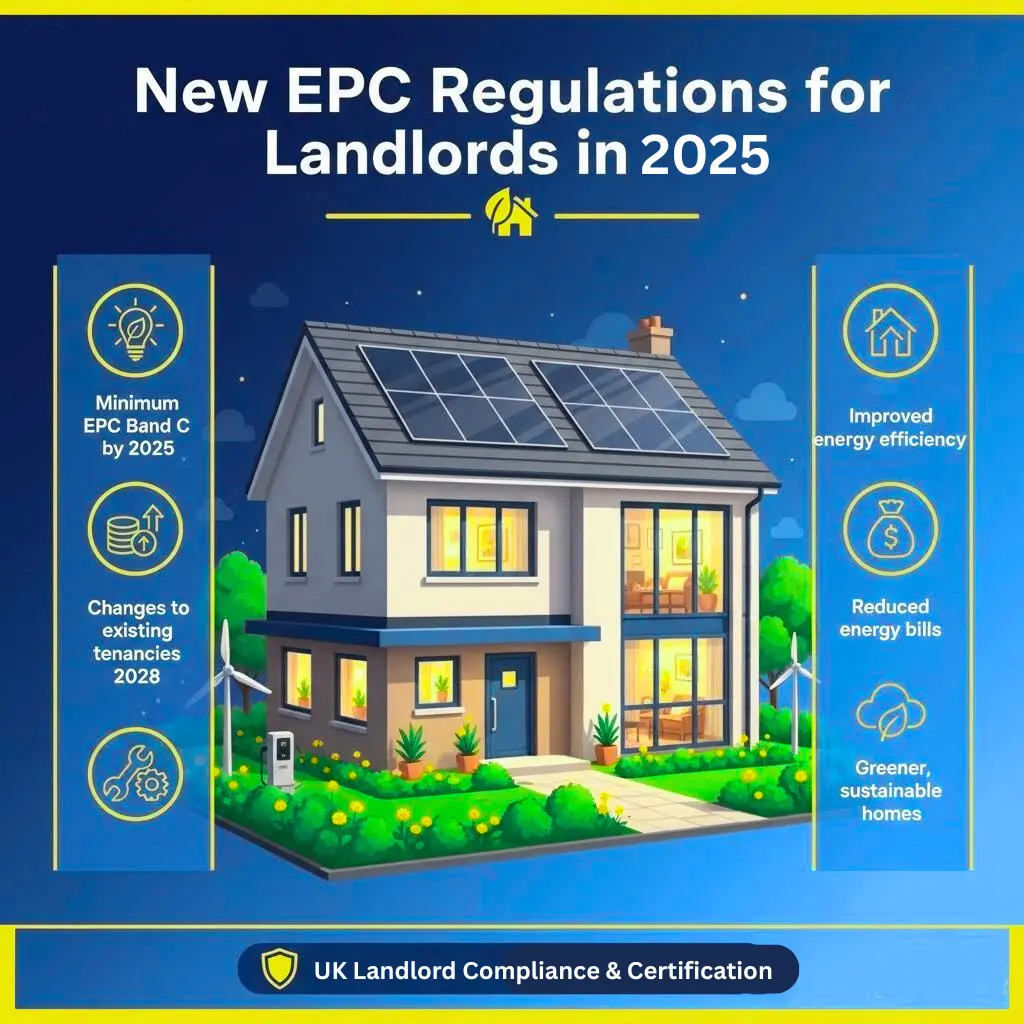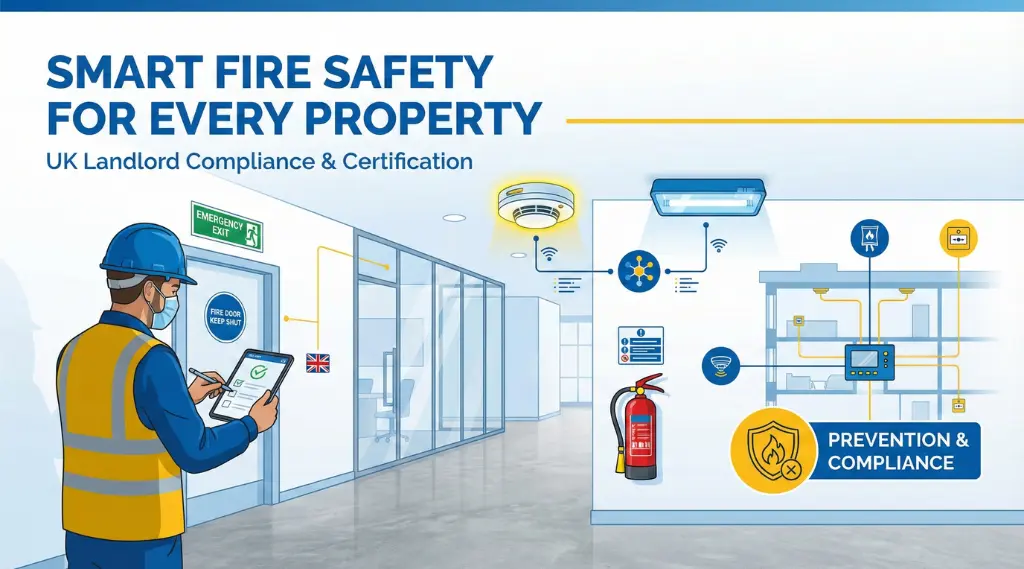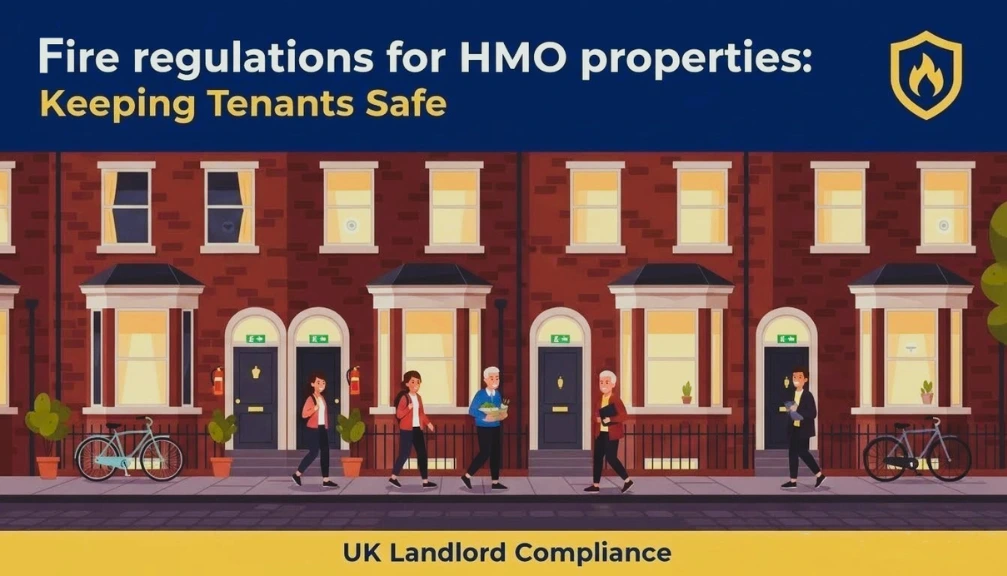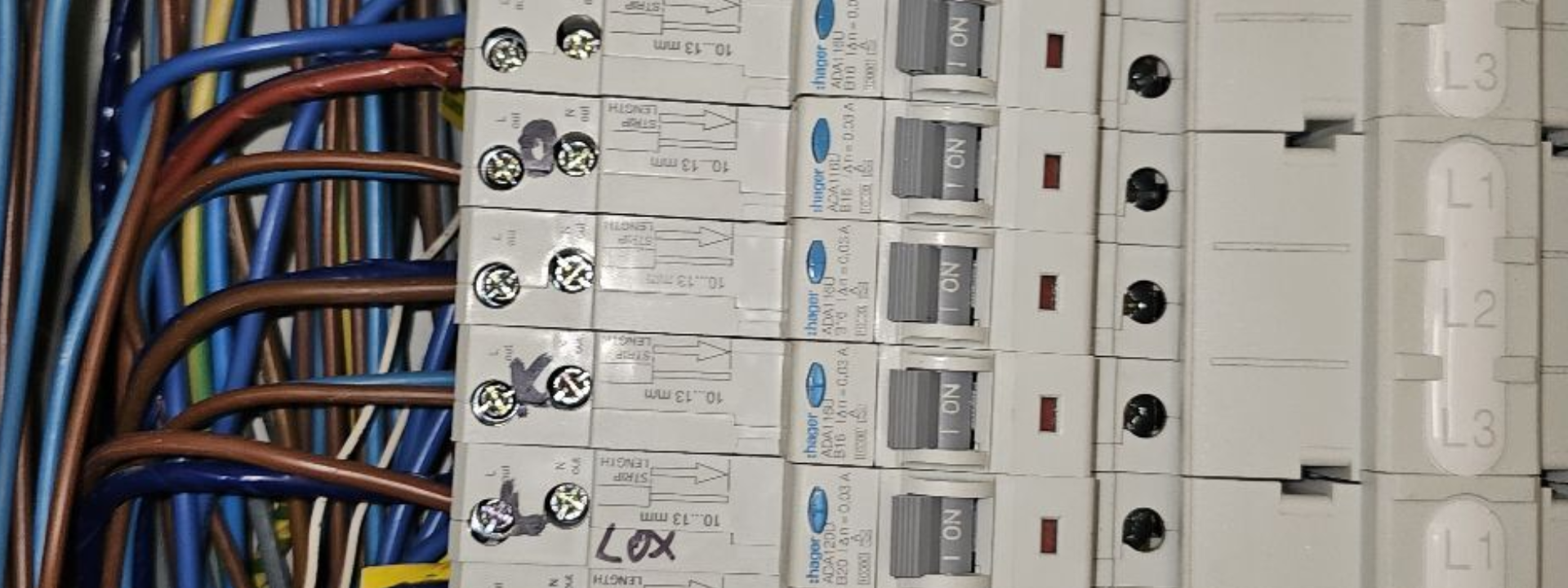Let’s start with a quick question. Do you know what happens if a rental home does not meet energy rules? Yes, it can bring real trouble and high costs. Let me share an incident with you. In 2023, a landlord in Gloucestershire received a £4,500 fine after several rental properties showed EPC ratings of F and G, which are below the legal limit.
Now talk about a topic that every landlord needs to know. Those are the new EPC regulations for landlords in 2025. In this blog, we explain what an EPC is, why it matters for landlords, and the new rules. Let’s explore this.
What is an EPC and why does it matter for landlords?
An EPC, or Energy Performance Certificate, is a report that shows how energy-efficient a property is. For landlords, this matters because UK rental rules link to EPC scores. A good score means lower energy bills, a warmer, more comfortable home for tenants.
What does an EPC assess and how is the energy efficiency rating calculated?
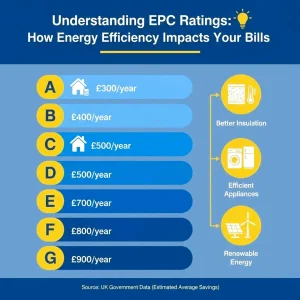
Do you know what EPCs do? They check how your home uses energy for heating, lighting, and hot water. The assessor visits the property and checks all the things that affect energy efficiency. Here’s what they check:
![]() Walls, floors, and roof – are they insulated or losing heat.
Walls, floors, and roof – are they insulated or losing heat.![]() Windows and doors – do they let heat escape or keep it in.
Windows and doors – do they let heat escape or keep it in.![]() Heating system – the type, age, and efficiency of boilers or radiators.
Heating system – the type, age, and efficiency of boilers or radiators.![]() Hot water system – how efficiently it heats water.
Hot water system – how efficiently it heats water.![]() Lighting – are low-energy bulbs used.
Lighting – are low-energy bulbs used.![]() Renewable energy sources – like solar panels or heat pumps.
Renewable energy sources – like solar panels or heat pumps.
Once all this information is gathered, the assessor enters it into a government-approved tool called RdSAP, which stands for Reduced Data Standard Assessment Procedure. This is where the energy efficiency rating is calculated.
Here’s how it works
![]() The system checks how much energy your home uses in a year for heating, lights, and hot water.
The system checks how much energy your home uses in a year for heating, lights, and hot water.![]() Then it compares your home to an average house of the same size.
Then it compares your home to an average house of the same size.![]() After that, it gives a score from A to G. A means the home is very efficient, G means it needs work.
After that, it gives a score from A to G. A means the home is very efficient, G means it needs work.![]() It also gives tips to improve the home, like adding insulation, getting a new boiler, or using energy-saving lights.
It also gives tips to improve the home, like adding insulation, getting a new boiler, or using energy-saving lights.
The energy efficiency rating meaning is the number that defines how energy-efficient your home is. A higher score means lower bills, and a lower score means the home uses more energy.
How long is an EPC certificate valid and when should landlords get one?
That is the important thing about EPCs. An EPC is valid for 10 years. But it’s a good idea to get a fresh one before a new tenant moves in. Landlords need a new certificate when:
![]() Renting a property for the first time.
Renting a property for the first time.![]() Making big renovations that boost energy efficiency, like new insulation or heating upgrades.
Making big renovations that boost energy efficiency, like new insulation or heating upgrades.![]() Getting the property ready to advertise.
Getting the property ready to advertise.
Having a valid EPC avoids fines, keeps tenants happy, and makes renting your property stress-free.
Who can produce a valid EPC and what does the inspection involve?
Some landlords ask us, “Can I make an EPC myself?” The answer is no. Only a qualified domestic energy assessor can produce a valid EPC.
Here’s what happens during the inspection:
![]() The assessor looks at insulation, heating, windows, and lighting.
The assessor looks at insulation, heating, windows, and lighting.![]() Checks any renewable energy systems you installed.
Checks any renewable energy systems you installed.![]() Gives you the energy efficiency rating and certificate.
Gives you the energy efficiency rating and certificate.
After that, you keep the certificate ready for tenants and official checks.
Have the new EPC regulations 2025 been scrapped or are they still coming into force?
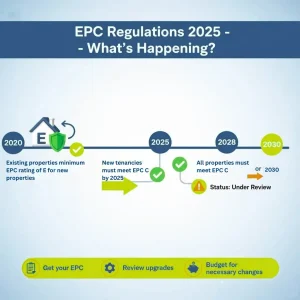
There’s a lot of talk about the new EPC regulations 2025 scrapped, and landlords need clarity. These rules affect what properties need and when, so it’s important to know what’s confirmed and what is still proposed. Let’s start.
What recent government announcements affect the 2025 timeline?
The government provides updates to help landlords understand the new EPC regulations for landlords in 2025. Here is what landlords need to know:
![]() The government launched a major consultation on EPC reform in December 2024.
The government launched a major consultation on EPC reform in December 2024.![]() From 2026, EPCs will use a new methodology called the Home Energy Model (HEM) with updated metrics (fabric, heating efficiency, smart readiness).
From 2026, EPCs will use a new methodology called the Home Energy Model (HEM) with updated metrics (fabric, heating efficiency, smart readiness).![]() There’s a proposal to raise the minimum EPC standard for rented homes to C:
There’s a proposal to raise the minimum EPC standard for rented homes to C:![]() New tenancies: from April 2028.
New tenancies: from April 2028.![]() All tenancies: by April 2030.
All tenancies: by April 2030.![]() A £15,000 cost cap per property is proposed, plus a possible exemption if costs are too high.
A £15,000 cost cap per property is proposed, plus a possible exemption if costs are too high.![]() The government requires a new, reformed EPC before making improvements, and that cost counts toward the cap.
The government requires a new, reformed EPC before making improvements, and that cost counts toward the cap.![]() EPC validity rules change, the government is consulting on shortening the validity period.
EPC validity rules change, the government is consulting on shortening the validity period.![]() A new version of RdSAP (RdSAP 10) is due from 15 June 2025, which will update how EPCs are calculated in existing homes.
A new version of RdSAP (RdSAP 10) is due from 15 June 2025, which will update how EPCs are calculated in existing homes.
How to interpret proposed changes vs confirmed regulations?
We know it is confusing to know what is proposed and what the law is. Here’s how to stay on top of the EPC rules for landlords 2025:
First, understand what “proposed” means:![]() These are ideas the government is consulting on, not yet a law.
These are ideas the government is consulting on, not yet a law.![]() Proposals include new EPC metrics (fabric performance, heating efficiency, smart readiness).
Proposals include new EPC metrics (fabric performance, heating efficiency, smart readiness).![]() There’s a suggested £15,000 cap for property upgrades, with possible exemptions.
There’s a suggested £15,000 cap for property upgrades, with possible exemptions.![]() Deadlines like “new tenancies by 2028, all by 2030” are part of the proposal.
Deadlines like “new tenancies by 2028, all by 2030” are part of the proposal.![]() They are also asking for views on shortening EPC validity and when new EPCs are required.
They are also asking for views on shortening EPC validity and when new EPCs are required.
Now, know what’s confirmed:
![]() The government has officially launched consultations, so these proposals are being seriously considered.
The government has officially launched consultations, so these proposals are being seriously considered.![]() EPC reform (with new metrics) is expected in the second half of 2026.
EPC reform (with new metrics) is expected in the second half of 2026.![]() Some transitional rules are proposed: if a property already has an EPC rated “C” under the current system, it will be considered compliant until the EPC expires.
Some transitional rules are proposed: if a property already has an EPC rated “C” under the current system, it will be considered compliant until the EPC expires.![]() The validity of EPCs has been reduced from 10 years.
The validity of EPCs has been reduced from 10 years.
What should landlords do now if regulations are delayed or amended?
Even if the timeline shifts, landlords can take steps now to stay ready for the EPC changes for landlords 2025:
![]() Assess your properties’ current EPC ratings to understand improvement needs.
Assess your properties’ current EPC ratings to understand improvement needs.![]() Plan upgrades based on confirmed standards in EPC regulations 2025.
Plan upgrades based on confirmed standards in EPC regulations 2025.![]() Keep detailed records of assessments and work carried out.
Keep detailed records of assessments and work carried out.![]() Consult official guidance and energy efficiency schemes to stay compliant.
Consult official guidance and energy efficiency schemes to stay compliant.![]() Use energy-saving measures like insulation, double glazing, or low-carbon heating to meet the new EPC regulations for landlords in 2025.
Use energy-saving measures like insulation, double glazing, or low-carbon heating to meet the new EPC regulations for landlords in 2025.
How do EPC certificate requirements affect landlords in 2025?
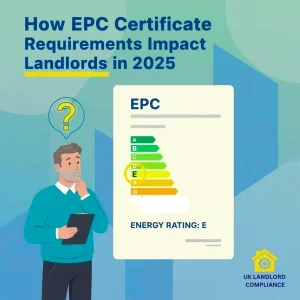
Energy Efficiency for Landlords helps you stay legal, save money, and keep tenants happy. Let’s discuss the EPC certificate for landlords and how they will be impacted in 2025. These rules are important if you rent out property in the UK.
When must landlords provide an EPC to tenants or prospective tenants?
Let’s explore what Energy Performance Certificates mean for tenants. Landlords need to ensure tenants get this information before moving in. Here’s what to keep in mind:
![]() EPC must be given before a property is rented or sold.
EPC must be given before a property is rented or sold.![]() Tenants have a right to see the EPC, and it is easy to read.
Tenants have a right to see the EPC, and it is easy to read.![]() A valid EPC lasts 10 years, so check the expiry date before listing.
A valid EPC lasts 10 years, so check the expiry date before listing.![]() UK law under The Energy Performance of Buildings (England and Wales) Regulations 2012 sets these rules.
UK law under The Energy Performance of Buildings (England and Wales) Regulations 2012 sets these rules.
How to renew or update an EPC after improvements are made?
If landlords make changes to improve energy efficiency, the certificate needs updating. Here’s how to do it without hassle:
![]() Book a registered assessor to inspect the property again.
Book a registered assessor to inspect the property again.![]() Provide details of new installations like heating, insulation, or double glazing.
Provide details of new installations like heating, insulation, or double glazing.![]() The updated EPC shows the new energy rating, which may help attract tenants.
The updated EPC shows the new energy rating, which may help attract tenants.![]() Following UK Government guidance, updated certificates must be lodged with the official register.
Following UK Government guidance, updated certificates must be lodged with the official register.
How to store and present EPC documentation to meet legal requirements?
Keeping EPCs organised is just as important as getting one. Take a look at this checklist:
![]() Keep a digital copy for easy access and sharing.
Keep a digital copy for easy access and sharing.![]() Print a physical copy to hand to tenants or during inspections.
Print a physical copy to hand to tenants or during inspections.![]() Make sure the certificate is always available at the property for tenants.
Make sure the certificate is always available at the property for tenants.![]() Comply with landlord epc requirements 2025 by storing certificates for the duration of the tenancy.
Comply with landlord epc requirements 2025 by storing certificates for the duration of the tenancy.
What do landlords need to know about future changes and EPC rules for landlords in 2025 and 2030?
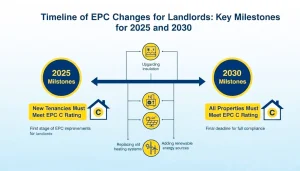
Let’s dive into the new energy rules hitting landlords in 2025 and 2030. Things are changing, and your rental homes need to meet new EPC standards to stay on the right side of the law.
How will the 2025 rules connect to new EPC regulations for landlords in 2030?
Let’s break it down. The 2025 rules are a bridge. They show the new measurements, costs, and schedule so landlords follow the rules by 2030. Without 2025’s steps, the new EPC regulations for landlords in 2030 do not work. Here’s what landlords need to know:
![]() Upgrades made for 2025 count toward meeting 2030 requirements.
Upgrades made for 2025 count toward meeting 2030 requirements.![]() Energy improvements like insulation, modern heating, or better windows help both now and later.
Energy improvements like insulation, modern heating, or better windows help both now and later.![]() Ignoring the 2025 rules means more expensive work in 2030.
Ignoring the 2025 rules means more expensive work in 2030.![]() Following these rules keeps your rental legally compliant and attractive to tenants.
Following these rules keeps your rental legally compliant and attractive to tenants.
These rules come from the Energy Efficiency (Private Rented Property) (England and Wales) Regulations 2015 and are guided by the Energy Act 2011.
What long-term upgrade plans should landlords start now to avoid repeated works?
Think about upgrades that save you time and money later. Here are some things landlords can start:
![]() Loft and wall insulation to keep homes warmer and cut bills.
Loft and wall insulation to keep homes warmer and cut bills.![]() Energy-efficient windows and doors that improve EPC ratings.
Energy-efficient windows and doors that improve EPC ratings.![]() Smart heating systems to control energy use easily.
Smart heating systems to control energy use easily.![]() Upgrade old boilers to low-carbon or electric systems.
Upgrade old boilers to low-carbon or electric systems.![]() Spread improvements over time instead of doing everything at once, so it’s easier on your wallet and tenants.
Spread improvements over time instead of doing everything at once, so it’s easier on your wallet and tenants.
Where can landlords find grants, finance or professional help for energy improvements?
You don’t need to tackle upgrades all by yourself. There are plenty of ways to get a hand, and a little support can make the whole process much easier. Here’s where to look:
![]() ECO scheme – helps cover the cost of heating and insulation work.
ECO scheme – helps cover the cost of heating and insulation work.![]() Local council grants – sometimes available if tenants need extra support.
Local council grants – sometimes available if tenants need extra support.![]() Green loans – banks offer these for bigger projects.
Green loans – banks offer these for bigger projects.![]() Certified energy assessors – they can tell you exactly what upgrades will boost your EPC rating.
Certified energy assessors – they can tell you exactly what upgrades will boost your EPC rating.
Properties with an EPC rating below E require a new EPC and efficiency improvements. Energy efficiency of a property affects comfort for tenants and can lower energy bills. Rental properties rated D to G need updates. From 2028, new tenancies must meet at least EPC band C.
Do the new EPC regulations 2025 apply to commercial property and how?
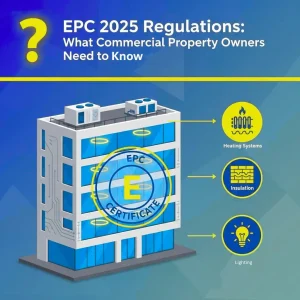
Let’s discuss the new EPC regulations 2025 and how they affect commercial property. These rules work to make buildings more energy-efficient, save money on bills, and reduce carbon emissions.
Which commercial buildings must meet EPC standards by 2025?
If you own or manage commercial buildings, you need to know which ones the regulations cover. The new EPC regulations 2025 commercial property rules mean landlords need to check if their building meets the minimum energy efficiency standard. Here’s what happens:
![]() Any commercial property rented out must have a valid EPC.
Any commercial property rented out must have a valid EPC.![]() By 2025, the building needs at least an E rating to be legally rented.
By 2025, the building needs at least an E rating to be legally rented.![]() Landlords are not following this. They face fines or being stopped from renting the property.
Landlords are not following this. They face fines or being stopped from renting the property.![]() The rules are part of the Minimum Energy Efficiency Standards (MEES) under UK law.
The rules are part of the Minimum Energy Efficiency Standards (MEES) under UK law.
Are the required ratings different for commercial vs residential properties?
The rating targets do change depending on the property type. As a landlord, you need to know about that. In this table, we talk about the new EPC regulations 2025 for residential property and commercial properties:
Aspect
Residential
Commercial
Current Minimum EPC
E or higher
E or higher
2025 Requirement
New tenancies: C or higher
All let properties: valid EPC; new leases: C proposed
2030 Target
All tenancies: C
Minimum C, with B where cost-effective
Calculation Changes
EPC methodology may change around 2026
Generally same methodology, may adopt stricter standards for B rating
Penalties
Fines possible for non-compliance
Significant fines up to £150,000 possible
Exemptions
For very costly improvements
For very costly improvements
Aspect
Residential
Commercial
Current Minimum EPC
E or higher
E or higher
2025 Requirement
New tenancies: C or higher
All let properties: valid EPC; new leases: C proposed
2030 Target
All tenancies: C
Minimum C, with B where cost-effective
Calculation Changes
EPC methodology may change around 2026
Generally same methodology, may adopt stricter standards for B rating
Penalties
Fines possible for non-compliance
Significant fines up to £150,000 possible
Exemptions
For very costly improvements
For very costly improvements
What upgrades are commonly needed for commercial landlords to comply?
Landlords can take simple steps to meet the new EPC regulations 2025 requirements:
![]() Switch old lighting to LED or low-energy lights.
Switch old lighting to LED or low-energy lights.![]() Improve insulation in walls, roofs, and floors.
Improve insulation in walls, roofs, and floors.![]() Upgrade heating and cooling systems to energy-efficient models.
Upgrade heating and cooling systems to energy-efficient models.![]() Install energy monitoring systems or smart meters.
Install energy monitoring systems or smart meters.![]() Replace old windows with double or triple glazing.
Replace old windows with double or triple glazing.
A certified energy assessor can identify which upgrades have the most significant impact.
What are the minimum energy efficiency standards for rental properties in 2025?
In 2025, the minimum energy‑efficiency rule for rental homes in England and Wales is still an EPC rating of E. The government is consulting on raising that to EPC C by 2030, with new tenancies needing to hit C from 2028 onward.
What EPC rating will be required for different property types?
Remember, the EPC rating shows how energy-efficient a property is, so landlords can see what changes to make. Different properties have different needs, so the EPC rules apply like this:
![]() Houses and flats: Must reach at least a C rating.
Houses and flats: Must reach at least a C rating.![]() Non-domestic rental properties: Must reach at least an E rating by April 2023, moving to C by 2030.
Non-domestic rental properties: Must reach at least an E rating by April 2023, moving to C by 2030.![]() Shared or multi-occupancy properties: Each unit must meet the minimum rating individually.
Shared or multi-occupancy properties: Each unit must meet the minimum rating individually.
New tenancies from 2028 need at least EPC band C. Properties rated EPC D to G require efficiency improvements to your property. New or existing tenants must rent homes that have a minimum energy rating. Property has an EPC rating, and landlords need to get a new one to meet limits set by the regulations.
What exemptions exist and how can landlords apply for them?
let’s be honest. Not every property can achieve the minimum rating immediately. Some landlords get extra time to make their property energy efficient. Here’s when that can happen:
![]() Costs: If upgrades cost more than £3,500, landlords can apply for an exemption.
Costs: If upgrades cost more than £3,500, landlords can apply for an exemption.![]() Listed buildings: Historic or listed buildings can be exempt if improvements damage their character.
Listed buildings: Historic or listed buildings can be exempt if improvements damage their character.![]() Temporary exemptions: Properties under major renovation may qualify.
Temporary exemptions: Properties under major renovation may qualify.
To apply for exemptions:
![]() Complete the online form on the government website.
Complete the online form on the government website.![]() Provide evidence, like quotes for improvement costs or planning documents.
Provide evidence, like quotes for improvement costs or planning documents.![]() Keep records in case of inspections.
Keep records in case of inspections.
What penalties apply for non-compliance with minimum standards?
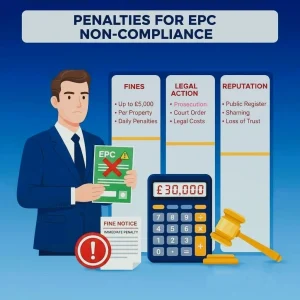
Let’s talk about what happens when landlords don’t follow the basic rules in the UK. There are real consequences, and councils take these rules seriously.
![]() Councils can issue improvement notices if a rented property is unsafe or below minimum standards.
Councils can issue improvement notices if a rented property is unsafe or below minimum standards.![]() Ignoring these notices can lead to financial penalties and possible prosecution under the Housing Act 2004.
Ignoring these notices can lead to financial penalties and possible prosecution under the Housing Act 2004.![]() Fines for non-compliance: up to £2,000 for less than three months, up to £4,000 for longer, with a total max per property of £5,000.
Fines for non-compliance: up to £2,000 for less than three months, up to £4,000 for longer, with a total max per property of £5,000.![]() Providing false information on the Private Rented Sector Exemptions Register can result in £1,000 fines.
Providing false information on the Private Rented Sector Exemptions Register can result in £1,000 fines.![]() New rules under the Renters’ Rights Act 2025 allow fines up to £7,000, with repeated serious breaches reaching £40,000.
New rules under the Renters’ Rights Act 2025 allow fines up to £7,000, with repeated serious breaches reaching £40,000.![]() Councils publicly name landlords and their properties when standards are not met, affecting their reputation.
Councils publicly name landlords and their properties when standards are not met, affecting their reputation.![]() Serious hazards like damp, mould, or broken fire safety systems can lead to criminal prosecution and court fines.
Serious hazards like damp, mould, or broken fire safety systems can lead to criminal prosecution and court fines.![]() Fines can include court costs and victim surcharges depending on the offense.
Fines can include court costs and victim surcharges depending on the offense.
Let me tell you a real incident. In Gateshead, a landlord named Mr Anthony Hall rented out three flats that had serious problems. There was damp and mould, broken windows, missing handrails, and even electrical hazards.
The council stepped in and gave him Improvement notices under the Housing Act 2004, telling him to fix everything. But he didn’t work.
Because he ignored the notices, the council took him to court. He was fined £1,115 for each flat, which added up to £3,345, plus a £446 victim surcharge and £3,200 in court costs.
This incident clearly shows that councils don’t give warnings. They use their legal powers to ensure tenants stay safe.
What Happens If Your Property Doesn’t Meet EPC Rules for Landlords 2025?
If a rental home does not meet the 2025 EPC rules, a few things happen. The council gives a large fine that reaches up to £30,000. The home is not allowed to go on the rental market until the energy grade improves.
Exemptions and Special Circumstances for EPC Compliance
You can still stay on the right side of UK regulations if you follow the steps and keep the right proof. Let’s dive into this:
1. What You Can Use as an Exemption![]() Upgrade work hits the cost cap set under MEES, and the rating still stays below E.
Upgrade work hits the cost cap set under MEES, and the rating still stays below E.![]() You can’t get consent from a freeholder, a neighbor, or another party.
You can’t get consent from a freeholder, a neighbor, or another party.![]() Upgrade work creates a risk to the building, for example, damp or structural damage.
Upgrade work creates a risk to the building, for example, damp or structural damage.![]() The home sits on a listed or protected status, and upgrades don’t fit heritage rules.
The home sits on a listed or protected status, and upgrades don’t fit heritage rules.
2. What You Need to Do![]() Add the property to the PRS Exemptions Register.
Add the property to the PRS Exemptions Register.![]() Keep clear documents like quotes, survey notes, and emails.
Keep clear documents like quotes, survey notes, and emails.![]() Renew your exemption every five years.
Renew your exemption every five years.
The Renters’ Rights Act 2025 receives royal assent, bringing changes for private landlords in England and Wales. Privately rented properties need a minimum EPC rating of C. This rule applies to new and existing tenancies. Landlords check the property’s current EPC rating and make improvements to meet the new standards.
Options for Landlords with Low-Rated Properties
A low EPC rating does not mean a dead end. Many small changes lift the score without heavy work.
Easy Wins
![]() LED lighting.
LED lighting.![]() Drought-proofing around doors and windows.
Drought-proofing around doors and windows.![]() Better heating controls.
Better heating controls.![]() Hot water tank insulation.
Hot water tank insulation.
Bigger Steps That Bring Strong Gains
![]() Loft insulation.
Loft insulation.![]() Cavity wall insulation.
Cavity wall insulation.![]() Smart electric heating upgrades.
Smart electric heating upgrades.![]() Solar PV if the home suits it.
Solar PV if the home suits it.
Letting agents and landlords plan ahead. The minimum EPC standard of C sets the energy efficiency rules for private rental properties. Getting a new EPC every few years tracks changes to EPC ratings. Properties in Wales need an EPC. Improving an EPC rating makes rented homes better for tenants and aligns rental properties with regulations.
Impact on Property Value and Tenant Demand
Energy performance now shapes how renters pick homes. Even with no confirmed new EPC rules for 2025, a stronger rating brings real benefits.
Market Effects![]() Higher EPC scores draw more tenant interest.
Higher EPC scores draw more tenant interest.![]() Homes with strong ratings gain trust from renters.
Homes with strong ratings gain trust from renters.![]() Valuers look at running costs and energy comfort.
Valuers look at running costs and energy comfort.![]() Agents report more viewing requests for energy-efficient homes.
Agents report more viewing requests for energy-efficient homes.
Why It Matters![]() Tenants look for lower energy bills.
Tenants look for lower energy bills.![]() Warmer homes feel more comfortable.
Warmer homes feel more comfortable.![]() Better ratings help long-term rental success.
Better ratings help long-term rental success.
Wrap Up
It’s time to wrap up. After reading this blog, you will gain more tips and insights on maintaining your property’s efficiency and full compliance. Keep your property safe and compliant by obtaining your EPC (Energy Performance Certificate) or electrical certificate today. Follow the regulations closely, secure your official certificate from All Landlords Certificate, and give your tenants peace of mind. Take action now to ensure your rental meets all legal and safety standards.
